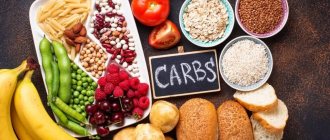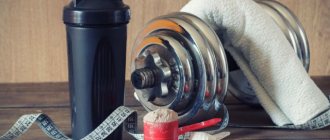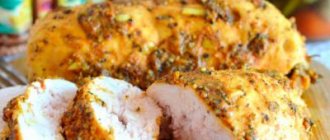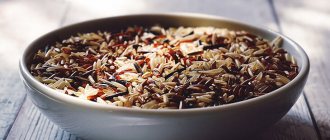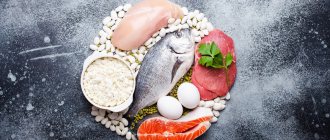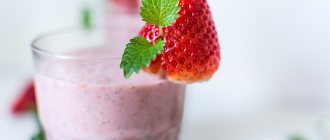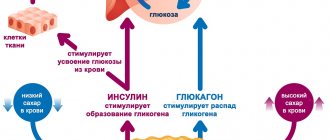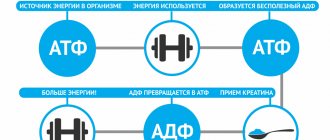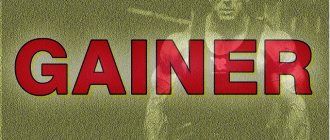When you are faced with the task of not just losing a couple of extra pounds, but building muscle mass, you should resort to an intense strength program. This will require you to reconsider your daily diet. You will need products that can quickly and effectively restore daily muscle glycogen stores.
Carbohydrates for gaining muscle mass provide the body with the energy it needs and help to recover after serious physical exertion.
Carbohydrates and their effects
Moving into molecular language, a carbohydrate is a combination of three chemical elements: oxygen, carbon, hydrogen. There are several forms of carbohydrate: sugar, starch, fiber. They are also divided into simple and complex, depending on the rate of their absorption in the body.
All types of carbohydrates are nutritious and necessary for the body because they produce glucose, a source of energy. The minimum portion of glucose that we regularly use is found in the blood; the rest, in the form of glycogen, is found in muscle tissue and the liver, and is used as needed between meals. When energy exceeds its norms in the body, glucose begins to turn into fat. However, when carbohydrate reserves are depleted, the body primarily begins to absorb protein from muscle tissue, rather than fat deposits. This is why it is very important to eat right and maintain glycogen levels so that carbohydrates act in the right direction when gaining muscle mass.
What time of day is best to eat complex carbohydrates?
It is optimal to take them in the morning. Any nutritionist will confirm that the best breakfast is oatmeal or buckwheat porridge. These meals do not cause a surge in insulin in the blood; as a result, the athlete will not feel hungry after a couple of hours, but will be able to have a light snack and then eat a full lunch.
It is better not to eat carbohydrates for dinner - the last meal should be protein. It could be grilled fish, chicken breast chop, caviar, seafood salad, or a portion of a protein shake.
Good and bad carbohydrates
Not all carbohydrates are good for the body. You should remember which foods contain simple and complex carbohydrates. Namely, the slower the sugar molecules are digested, the better. Each product has its own glycemic index. The faster the sugars are absorbed from this food, raising blood glucose levels, the higher the glycemic index.
Which carbohydrates are useless for gaining muscle mass? List of products with increased index:
- Fried potatoes.
- White bread.
- Mashed potatoes.
- Honey.
- Sugar.
- Muesli.
- Pasta.
- Beet.
- Bananas.
- Chocolate.
- Biscuit.
- White rice.
- Corn.
- Jam.
The following is a list of complex carbohydrates for gaining lean body mass:
- bran bread;
- cereals;
- oatmeal;
- peas;
- buckwheat;
- fresh fruit juice;
- Red beans;
- lentils;
- fresh fruits;
- black chocolate;
- soy;
- green vegetables;
- tomatoes;
- mushrooms;
- lemon.
Despite the fact that some of the listed products are a source of simple carbohydrates, fiber does not allow sugar to be produced and absorbed into the blood.
Millet porridge
Millet porridge is a porridge made from purified millet grains. It contains a large amount of starch. For people who are losing weight, this is not the best cereal option.
Another disadvantage is the low fiber content (about 4%) per 100g. Despite these disadvantages, millet has a rich vitamin and mineral composition.
Helps cleanse the body of toxins, maintain normal blood pressure, strengthen bone tissue and teeth. Composition per 100g of product: proteins – 12g, fats – 3g and carbohydrates – 69g. Due to its starch content, consume millet in the first half of the day.
Power in nutrition
The decision by some athletes to reduce their carbohydrate intake to reduce the likelihood of fat accumulation is a misconception. Complex carbohydrates for gaining muscle mass, especially those with a low glycemic index, are very important. Proper consumption of this biological fuel makes it possible to train harder and longer, increase the load from exercise, gain muscle mass and at the same time burn excess fat. Limiting yourself in carbohydrates, on the contrary, reduces endurance and mental performance due to a drop in glucose levels. It is very important to eat foods that are digested more slowly, are rich in fiber, and combine them with the right amount of protein and fat.
Bulgur
Not everyone knows what bulgur is. However, it is very common in Mediterranean cuisine, Azerbaijan, Armenia, Asia, the Middle East and India.
Bulgur is a porridge made from wheat, in which the grains are heat-treated with water, then dried (traditionally in the sun) and, as a rule, cleared of bran and remaining impurities, after which the grains are crushed to the desired size.
Beneficial features:
- contains folic acid (useful for the female body) and a number of important macro- and microelements
- cereal is rich in saturated fatty acids
- easily digested and absorbed
- speeds up metabolism
- has a positive effect on the nervous system and emotional state due to the high content of B vitamins
- it is possible to use bulgur as a scrub - improves the condition of the skin, fills it with radiance
- The anti-inflammatory properties of bulgur are known
In 100 grams of bulgur:
Dry calories: 342 kcal
Proteins= 12.3g
Fat = 1.3g
Carbohydrates= 57.6g
Diet before and after training
Glucose, which is quickly converted into energy and also quickly consumed during exercise, cannot be a complete source of nutrients.
List of foods with carbohydrates for gaining muscle mass:
- Brown rice
- All cereals.
- Wholemeal pasta.
- Skim cheese.
- Chinese noodles.
There are two possible exceptions to the rules regarding nutrition, before and after strength training. One hour before physical training, you can consume carbohydrates with a high glycemic index, for example, kefir, boiled potatoes, low-fat yogurt, at the rate of 1 gram of carbohydrates per kilogram of weight.
30 minutes after exercise, it is recommended to replenish lost energy with foods with an average glycemic index: special sweet protein drinks, totaling 100 grams of carbohydrates. Protein activates glycogen production in muscles and liver.
How to gain lean muscle mass
We all agree that in order to gain weight we must eat, right?
I think so too, otherwise you have come to the wrong site.
5 Tips for Lean Bulk (Carbohydrate Rotation)
5 basic tips to stay in good shape even during the bulking period
If you train without taking any drugs, you will not be able to gain weight or significantly build muscle without a calorie surplus, in other words, hypertrophy is only possible by consuming more energy than you expend.
Conversely, if you don't eat enough, your muscle size will likely decrease no matter how hard you train.
Athlete's diet
A sports diet involves determining the calorie content of all food consumed in order to determine how many carbohydrates are needed to gain muscle mass, and what is their daily requirement, in combination with fats and proteins. To grow muscles, a man needs to increase his caloric intake per day by about 20 percent. The average daily intake is 2700-3000 calories.
It is important that the products contain the most correct carbohydrates and fats, otherwise the diet will lead to a set of fat deposits rather than muscle growth.
How much carbohydrates, fats and proteins to eat to gain muscle mass:
- fats should make up 30-35 percent of daily calories, preferably in the form of vegetable oil,
- carbohydrates, only with a low glycemic index, about 50-60 percent,
- proteins – no more than 25 percent.
The role of BZHU in body weight gain
Proteins, fats and carbohydrates are components of any diet and it depends on us which elements will predominate in our diet. Accordingly, an imbalance of proportions leads to a gain not of muscle mass, but of fat mass.
Thus:
- proteins are the building material for muscles. Naturally, you can’t go anywhere without them;
- carbohydrates are a source of energy, without their use there will simply be no strength for active physical activity. Or rather, there will be strength, but most of the energy will be taken from proteins, which we need so much for building muscles;
- fats can also act as a source of energy (however, the body begins to spend them last). In addition, fats are responsible for the condition of our skin, hair, nails and other important body functions. But fats, like carbohydrates, are also different. In this case we are talking about polyunsaturated fats, for example Omega-3. They increase good cholesterol and reduce bad cholesterol.
To these three components it is also necessary to add training. Balanced exercise and training - you gain muscle mass. There is no training and an imbalance of carbohydrates in a large direction - an increase in fat mass occurs, since energy is not spent in the right direction, but accumulates in the form of fats “in reserve”.
Diet
What an approximate diet should look like:
- Morning. For breakfast, carbohydrates are required to gain muscle mass, and not fast ones, but complex ones, for example, oatmeal with fruit or honey.
- Dinner. During lunch, consume the most calories of the day. Without this, muscles will not grow, and fat deposits will also be minimized.
- Day. A healthy snack can consist of dried fruits, nuts or an omelette.
- Dinner. Light protein foods, such as lean fish or meat, with stewed vegetables in olive oil. Buckwheat is a source of carbohydrates.
Buckwheat porridge in bodybuilding
Buckwheat porridge is a porridge made from purified buckwheat. Thanks to its beneficial properties, buckwheat rightly began to be called the “Queen of Cereals.” Due to the optimal ratio of BJU (67% carbohydrates, 20% proteins, 3% healthy fats and 10% fiber) buckwheat porridge occupies one of the places of honor in an athlete’s diet.
Due to the content in its composition of many useful vitamins (groups B1, B2, B6, B9, E, A) and minerals (iron, potassium, calcium, phosphorus, magnesium, zinc, selenium), the immune system is strengthened, the functioning of the nervous system is stabilized, The walls of blood vessels are strengthened, cell growth increases, and many other positive processes occur in the body.
How is buckwheat porridge useful for an athlete? Firstly, it improves digestion, normalizes metabolic processes in the body, and secondly, it helps remove harmful toxins, allows you to lose excess weight and removes harmful cholesterol. I consume buckwheat for breakfast with an omelet and two hours before training to provide the body with energy for a productive day and training.
Calculation of carbohydrates
How many carbohydrates do you need to gain muscle mass? Of the total calories consumed during the day, about 50-60 percent should be carbohydrates. 1 gram of carbohydrates = 4 calories. Let's say an athlete consumes 3,000 calories per day. 50 percent is 1,500 calories. Now we divide the amount of 1500 by 4 and we get 375 grams of carbohydrates per day.
Further, the amount of carbohydrates for gaining muscle mass will depend on the goal: if the goal is to gain weight, we consume about 500 calories with carbohydrates plus, if the goal is to dry the body, then 500 calories less.
Cardio
Some types of cardio should be performed 3-6 days a week, and alternate between long, low-intensity and high-intensity workouts for weight loss. Walking on an incline treadmill for 45 minutes is an ideal long-term cardio workout that should be done on strength training days (up to 3 times a week). Running outdoors, on a treadmill, and/or cycling are great options for high-intensity training on non-strength training days (2-3 times per week). You can read about options for high-intensity training in the material “High-intensity interval training for burning fat.”
Stick to your maximum limits: 3 cardio workouts and 3 high-intensity workouts per week. For athletes with an average metabolic rate, 3 high-intensity workouts, without cardio, are suitable. Those with a high metabolic rate only need 1-2 high-intensity workouts per week.
Protein norm per day
To increase muscles, in addition to carbohydrates, you also need proteins. The daily norm is 1.5-2.5 grams of protein per kilogram of body weight. To gain muscle mass by weight category you need:
- For men: weight 60 kg – 190 grams of protein, weight 70 kg – 200 grams, weight 80 kg – 210 grams.
- Women: weight 60 kg – 155 grams, weight 70 kg – 175 grams, weight 80 kg – 185 grams of protein.
The presence of fats is also important, especially omega-3 fatty acids. Lack of fat reduces hormone production and immunity.
Insulin
The hormone insulin is produced by the pancreas and transports nutrients to cells, lowering blood sugar levels. When carbohydrates are broken down, the body actively begins to produce insulin, which transfers glucose to the muscles in the form of glycogen. In addition, insulin promotes the restoration of muscle tissue and its further growth. Glycogen, proteins and fats begin to be synthesized, and muscle cells actively absorb amino acids.
The main thing is to remember which carbohydrates are more important for gaining muscle mass: complex ones, which take longer to digest and gradually turn into glucose.
Buckwheat
No wonder many call her the queen of porridges. Buckwheat porridge is a storehouse of useful substances, contains essential microelements and vitamins, and is rich in fiber. In addition, it is a complex, slowly digested carbohydrate, making it great for weight loss.
What other beneficial properties does buckwheat have?
- valuable source of vegetable protein and carbohydrates
- copper and cobalt contained in cereals help absorb calcium
- gives a long-lasting feeling of fullness
- Thanks to its fiber content, buckwheat will improve intestinal motility and help remove toxins and waste from the body
- rich in B vitamins, so buckwheat porridge can increase mental and physical performance, as well as stress resistance
In 100 grams of buckwheat:
Dry calories: 343 kcal
Proteins: 13.25 g
Carbohydrates: 71.5 g
Fat: 3.4 g
Creatine
Creatine is found in muscles. It promotes energy metabolism and is the basis of the energy replenishment system responsible for the growth and strength capabilities of human muscles. If the body receives few carbohydrates, insulin production is disrupted, and this, in turn, disrupts the performance of creatine.
Additional Products
To diversify your sports diet, you should know about foods with carbohydrates for gaining muscle mass and what additional nutrients they contain:
- Sunflower seeds. Source of protein and vitamin E. Reduces the negative effects of free radicals on muscle cells and restores them.
- Mackerel. Omega-3 fatty acids slow down the body's breakdown of protein until after exercise, another source of protein enters the stomach and is digested. Fish eaten for breakfast will have the same effect, even if enough time has passed before the start and end of the workout. And vitamin C, like collagen, is needed for the elasticity of muscles and ligaments.
- A pineapple. This fruit contains the enzyme bromelain, which helps digest proteins. It also reduces the muscle pain threshold after exercise.
- Venison. The meat of forest animals contains a lot of vitamin B12. This vitamin actively digests protein necessary for muscle growth. The main thing is to cook it correctly so that the meat is not tough.
- Coffee. Reduces muscle pain, thereby increasing the duration of training. Can be replaced with green tea.
- Beef. The best of all types of meat for an athlete's diet. Contains amino acids and creatine, which increase muscle mass and reduce fat mass. Promotes physical endurance.
- Ginger. The best pain reliever, of natural origin.
- Natural yogurt. Natural yoghurts are healthier because they contain fewer chemical additives and sugar. If desired, you can add fresh fruit. Lactic acid bacteria stimulate digestion and absorption of large doses of protein.
- Turmeric. The spice affects the restoration and growth of new cells, so necessary after strength training.
- Cucumbers. It is the cucumber peel that contains substances that strengthen the connective tissue of the human body.
- Milk. Muscles and bones need calcium. Give preference to milk with 3.5 percent fat content.
- Buckwheat. This cereal is rich in amino acids, which strengthen blood vessels and promote muscle growth. Strengthening blood vessels is important, since power loads significantly strain the circulatory system.
- Almonds. Vitamin E from almonds restores muscle cells faster after workouts. Daily dose – 8-10 pieces of sweet nut. In addition to physical strength, almonds improve your mood.
- Paste. Natural applesauce pastille is perfect if you want something sweet. It has a minimal amount of fat and calories, but a lot of protein.
- Eggs. In addition to protein, chicken eggs contain vitamin D, which is good for the elasticity of muscles and ligaments. However, you should not consume more than ten pieces per week.
- Tuna. One hundred percent protein. Consume one hour after strength training.
- Sweet red pepper. Contains a large amount of vitamin C, and without this antioxidant it is almost impossible to gain muscle mass. Choose only very red peppers.
- Lentils. Source of protein, iron, zinc. An important product for a sports diet.
- Asparagus. Champion in protein content, as well as potassium, zinc and fiber.
- Spirulina algae. This product consists of 65 percent protein, beta-carotene. It is recommended to add it to cocktails after consulting with your doctor, as it is a medicinal dietary supplement.
- Water. During the entire workout, be sure to drink water, as it quickly leaves the body. And a large loss of fluid prevents the body from working in the right direction.
So, the opinion that carbohydrates are evil and should be consumed as little as possible is wrong. The problem is not the carbohydrates themselves, but what they are, and how often we consume simple, quickly digestible substances that provide instant energy, thereby deceiving the body. Properly selected and planned nutrition will not only preserve your health, but also make your body beautiful and pumped up.
Comments for the site
Cackl e
